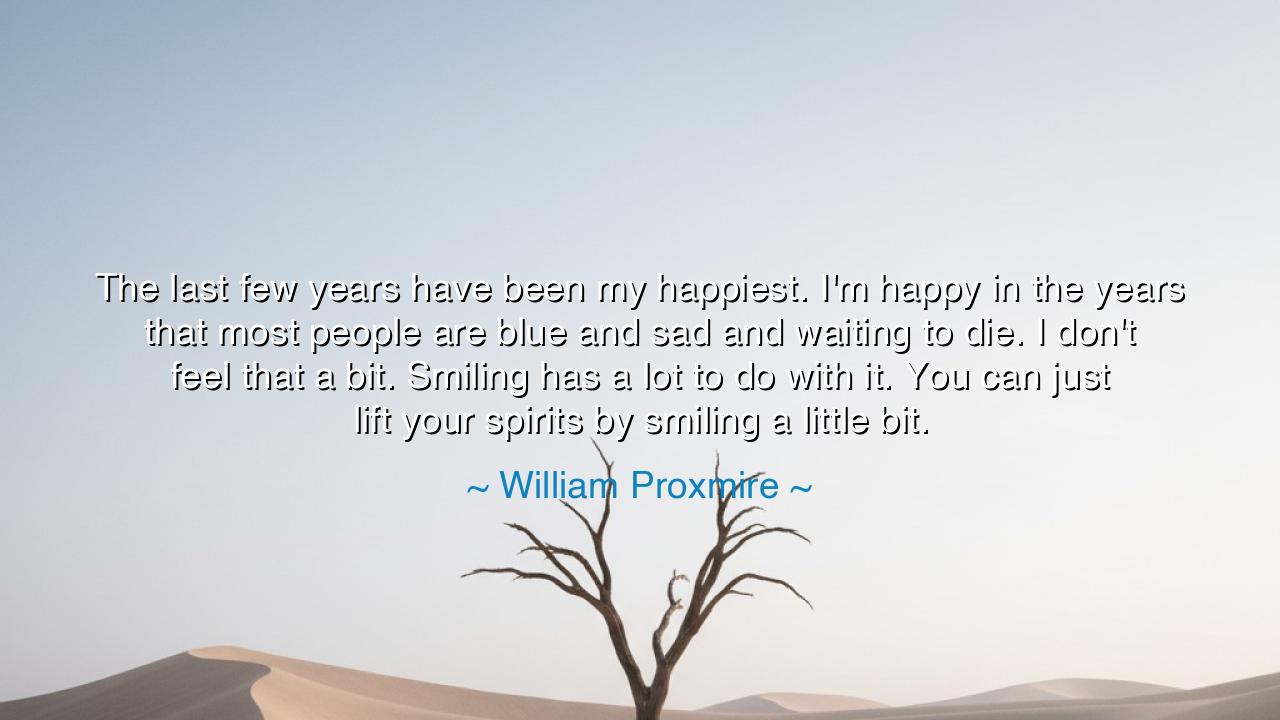
The last few years have been my happiest. I'm happy in the years
The last few years have been my happiest. I'm happy in the years that most people are blue and sad and waiting to die. I don't feel that a bit. Smiling has a lot to do with it. You can just lift your spirits by smiling a little bit.






When William Proxmire said, “The last few years have been my happiest. I'm happy in the years that most people are blue and sad and waiting to die. I don't feel that a bit. Smiling has a lot to do with it. You can just lift your spirits by smiling a little bit,” he was offering not a mere pleasantry, but a profound reflection born of age, acceptance, and wisdom. His words ring with the quiet power of a man who had seen the rise and fall of ambition, who had stood amid the storms of politics and time, and yet found peace not in glory, but in gratitude. Beneath his simple smile lies the philosophy of the ancients — that the spirit governs the fate of man, and that joy is not given by circumstance, but cultivated within the heart.
Proxmire, a longtime U.S. senator known for his integrity and tenacity, spent much of his life in the public eye. Yet as the years advanced and his career came to its natural close, he discovered a secret that many overlook — that happiness does not fade with youth, but can blossom even in the twilight of life if one’s heart remains open. Where others saw decline, he saw renewal; where others feared the end, he found freedom from illusion. His words remind us that aging, far from being a tragedy, is an awakening — the moment when one sees clearly that joy lies not in possession or success, but in attitude and awareness.
The ancients, too, knew this truth. The philosopher Epictetus taught that “it is not things themselves that disturb us, but our opinions about them.” To be “blue and sad,” as Proxmire described, is not an inevitable fate of age — it is a habit of mind. Those who grow bitter do so because they have chained their happiness to what time takes away. But those who smile, who accept the natural flow of life, discover that the passing of years cannot diminish the soul. Smiling, in Proxmire’s wisdom, is more than a gesture — it is a discipline of the spirit, an act of defiance against despair. It is the soul saying to life, “You may change my body, but you will not conquer my heart.”
Consider Nelson Mandela, who spent twenty-seven years in prison, yet emerged not consumed by anger, but radiant with forgiveness and serenity. Like Proxmire, he understood that the outer conditions of life cannot dictate the inner state of being. Both men saw that joy is a choice, an art cultivated by humility and gratitude. They understood that bitterness, like rust, corrodes the heart; while a smile — simple, sincere, and small — renews it daily. A smile does not deny pain; it transforms it, as sunlight turns the night sky to dawn.
There is also a kind of heroism in Proxmire’s words — the heroism of contentment. In a world that worships youth and achievement, he dared to declare that happiness can grow stronger as the body weakens, that peace can be found even in the shadow of mortality. This is the wisdom of the stoic, the sage, the elder who has lived enough to see that life’s true measure lies not in years, but in how lightly one carries them. By smiling, he demonstrated mastery over self — a grace that no wealth or office can bestow.
And yet, his reflection is not naive. It acknowledges loss and decline, but transcends them. “Most people are sad and waiting to die,” he said, not with scorn, but with compassion. He had simply chosen another way — a way of presence and joy, of laughter that defies fear. Like the Buddha beneath his tree or Socrates before the hemlock, Proxmire’s peace came from acceptance: to embrace life as it is, without demanding that it be otherwise.
The lesson his words leave us is timeless: happiness is not postponed, nor is it guaranteed by youth or health or fortune. It is built, moment by moment, by the practice of gratitude, the choice to meet each dawn with a smile instead of a sigh. We cannot control how long we live, but we can control how brightly we live. The act of smiling — of softening the heart against bitterness — becomes both shield and torch, warding off despair and illuminating the path ahead.
So, O seeker of peace, remember this teaching: life is not measured by its length, but by its light. When darkness gathers, smile. When others fear the end, smile still. For in that small act lies a great power — the power to lift your own spirit and remind the world that the heart, once awakened to gratitude, never truly grows old. As Proxmire discovered, those who can smile through the fading of days do not merely survive — they triumph.






AAdministratorAdministrator
Welcome, honored guests. Please leave a comment, we will respond soon